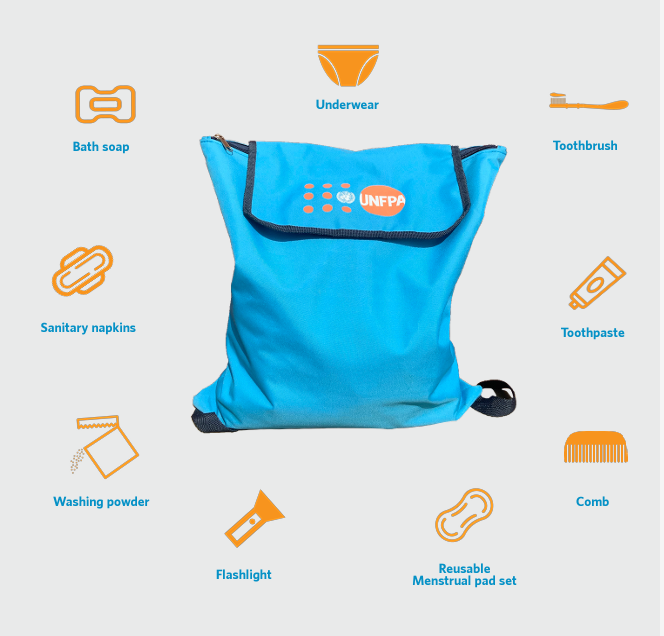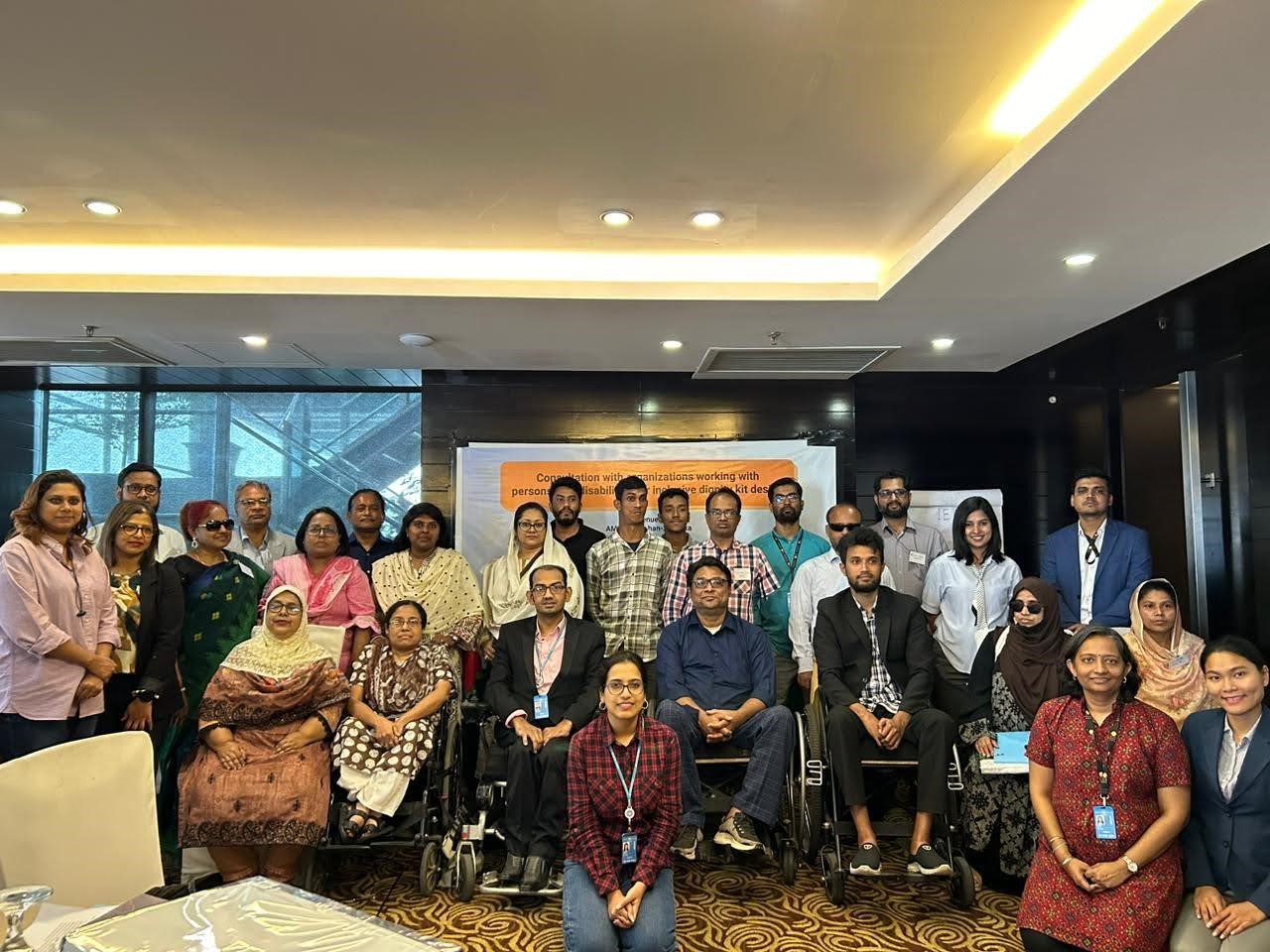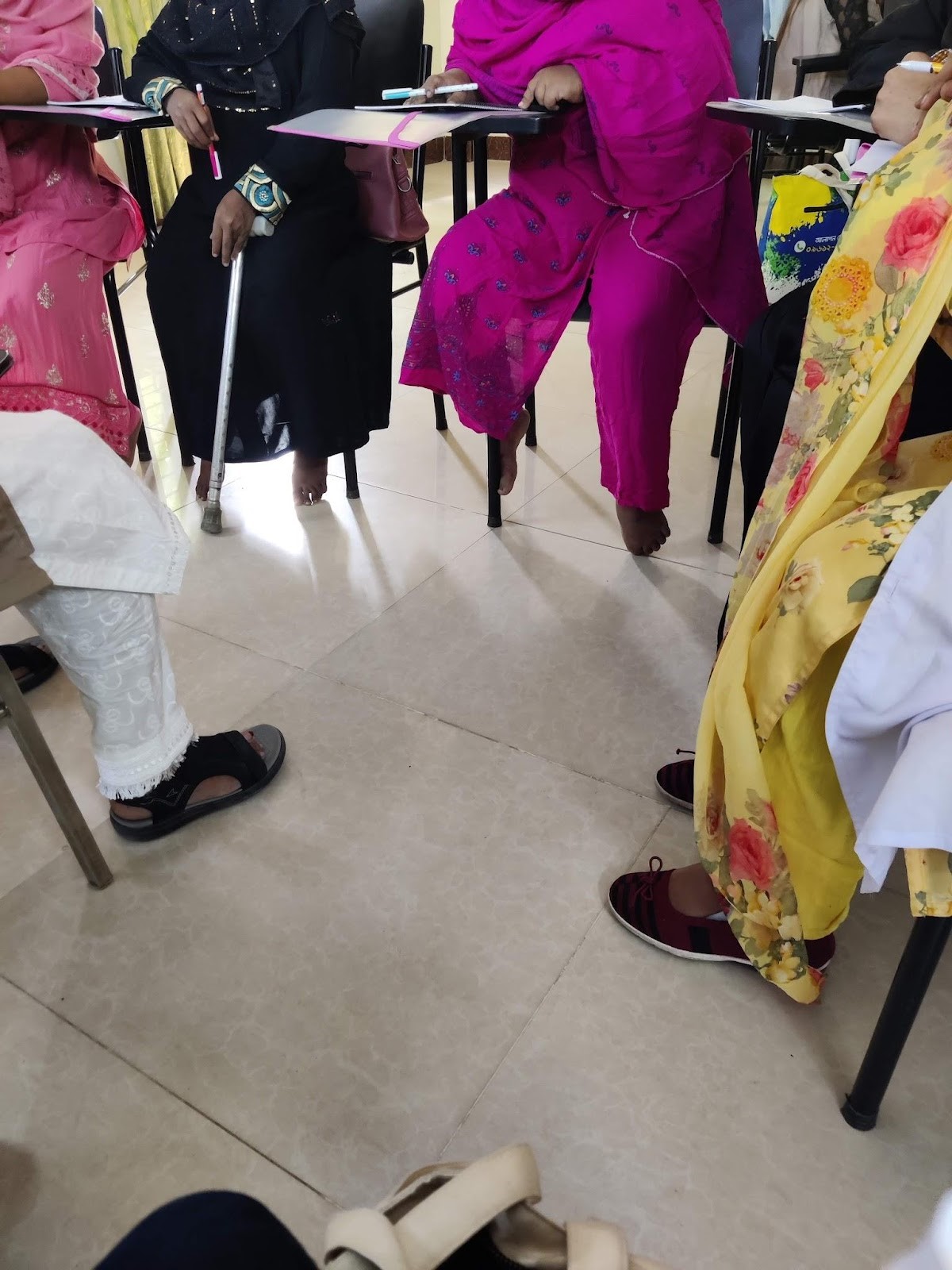Customising Dignity Kits and Menstrual Health Management Kits with women and girls with disabilities in Bangladesh with UNFPA
Since 2023, we have begun working on a gender workstream as part of our UK Aid-funded AT2030 programme to ensure women, girls, and people of minority genders have equal access to assistive technology (AT). As part of this workstream, we have collaborated with UNFPA, the United Nations Population Fund Asia-Pacific Regional Office (APRO), on a match-funded project which aims to capture the lived experiences of women and girls with disabilities and identify their specific needs during crises and humanitarian situations. In March 2024, we held consultation workshops with the UNFPA-Bangladesh Country Office. These activities aimed to consult with partners and stakeholders to discuss how the content of existing Dignity Kits (DKs) and Menstrual Health Management Kits (MHM Kits), often distributed during humanitarian crises, meet the needs of women and girls with disabilities.
Women of reproductive age typically comprise a quarter of a crisis-affected population. UNFPA’s humanitarian assistance is primarily targeted towards the needs of women and girls, including pregnant women and women and girls with disabilities. As the United Nations sexual and reproductive health agency, its focus remains on decreasing the risks of maternal and infant mortality and morbidity, unintended pregnancies, sexual and gender-based violence and exploitation, and ensuring safe and dignified access to essential services.
Two signature humanitarian response interventions targeting women and adolescent girls are Dignity Kits and Menstrual Health Management Kits. Over the years, these interventions have met the fundamental needs of women and girls affected by floods, cyclones and flash floods. Dignity Kits and Menstrual Health Management kits address disaster-affected women and girls' immediate hygiene needs and promote mobility and safety by providing them with age-appropriate, gender-sensitive, and culturally suitable garments and other essential items. These kits are distributed to ensure personal hygiene and sanitation during a disaster or crisis.

Figure 1 A generic Dignity Kit showing example items contained within.
Collaborating with UNFPA APRO, GDI Hub is assessing the existing kits and developing inclusively designed Dignity Kits, amongst other kits, that cater to the specific needs of women and girls with disabilities. The consultations will capture the lived experiences of women and girls with disabilities to inform the Kit design. The consultations will also focus on developing inclusive and accessible information, guidance, and distribution strategies for the kits, which include women and girls with disabilities.
We developed a methodology focusing on participatory design methods and storytelling to engage participants in co-designing activities to identify products for the customised kits for women and girls with disabilities. The consultation aimed to gather data and insights to develop inclusive and accessible information, guidance, and distribution strategies for the kits.
The insights and data gathered from these consultations will be used to:
- Propose items for inclusion, modification or removal in the customised Kits and alternatively review and further improve already customised kits.
- Review or revise Information Education and Communication (IEC) material provided with kits, identify additional information needed and ensure the material is accessible to women and girls with varying disabilities.
- Propose recommendations for safe and accessible distribution strategies.
- Identify needs beyond the provision of kits for women and girls with disabilities and prioritise them for future action.
The methodology includes consultation workshops with Organisations of Persons with Disabilities (OPDs) and women and girls with disabilities, followed by Key Informant Interviews with stakeholders. The methodology was specifically developed to ensure inclusion was at the centre. Therefore, we had varying approaches which could be adapted based on need. These included a two-full day in-person approach or a shorter online version. Each approach would ensure the relevant insights were collected and enable each country office to adapt and select the best tools for its target population.
This project partners with several country offices in the Asia and Pacific Region, including Bangladesh, Sri Lanka, Afghanistan, Indonesia and Fiji.
The UNFPA Bangladesh country office chose to undertake a preliminary online consultation with OPDs to confirm the approach, followed by in-person activities. The first in-person workshop was held in Dhaka, Bangladesh, with over ten OPDs representing a range of mobility and cognitive disabilities.
The participants identified the needs and barriers of women and girls with disabilities, not only from women and girls' perspectives but also from caregivers and their families' perspectives. The conversation lasted hours, and each participant was given time to share their experiences and expertise. Regarding modifying the kits, a wide range of items were proposed to be added, from disinfectants and medicines for managing menstrual cramps to assistive devices and wheelchairs. Some suggested a bigger font and/or braille for IEC materials for any labels. There were also suggestions for the inclusion of audio devices which would contain the required information.

Figure 2 Group photo of UNFPA Staff, OPD representatives and Dr Dilisha Patel from GDI Hub
We then travelled to Chakaria, in Cox’s Bazar, which is in the south of the country and prone to flooding, and home to the world’s largest refugee camp. Here, we partnered with Social Assistance and Rehabilitation for the Physically Vulnerable (SARPV), a national disability-prioritised development and humanitarian organisation. They facilitated the recruitment for two focus group discussions, one with women with disabilities, which focused on Dignity Kits, and another with adolescent girls with disabilities, focusing on Menstrual Health Management Kits. SARPV and UNFPA Bangladesh distributed DKs and MHM kits among girls and women with disabilities after the flood in 2023 in Chakaria Upazila. Therefore, much of the key discussions concerned their experience and items needed during evacuation.

Figure 3 Image from Focus Group Discussion with Women with disabilities.
Two key informant interviews were conducted with adolescent girls with disabilities to gather their experience during the humanitarian crisis and feedback on the kits. The kits and IEC materials successfully provide support and allow them to learn and improve their menstrual health. The preference for different types of menstrual products and the stigma around disability were observed.
By listening to women and girls directly, whilst the kits are greatly appreciated and essential in a crisis there is space to improve on what we can do to be more inclusive. What is central to inclusive design is the inclusion of people within the process. These workshops are doing precisely that, which will lead to inclusive kits that will benefit, and ultimately, reach more people. These key activities will contribute to a larger body of research to develop customised Dignity Kits and Menstrual Health Management kits for women and girls with disabilities to ensure they are not left behind in humanitarian response.